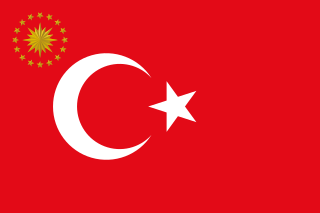
Suffrage, political franchise, or simply franchise is the right to vote in public, political elections and referendums. In some languages, and occasionally in English, the right to vote is called active suffrage, as distinct from passive suffrage, which is the right to stand for election. The combination of active and passive suffrage is sometimes called full suffrage.

The president of Turkey, officially the president of the Republic of Türkiye, is the head of state and head of government of Turkey. The president directs the executive branch of the national government and is the commander-in-chief of the Turkish military. The president also heads the National Security Council.

A popular initiative is a form of direct democracy by which a petition meeting certain hurdles can force a legal procedure on a proposition.
Women's suffrage is the right of women to vote in elections. Several instances occurred in recent centuries where women were selectively given, then stripped of, the right to vote. In Sweden, conditional women's suffrage was in effect during the Age of Liberty (1718–1772), as well as in Revolutionary and early-independence New Jersey (1776–1807) in the US.

The National Assembly was the authoritative legislative body of the Republic of China, from 1947 to 2005. Along with the Control Yuan and the Legislative Yuan, the National Assembly formed the tricameral parliament of the Republic of China.
Universal suffrage or universal franchise ensures the right to vote for as many people bound by a government's laws as possible, as supported by the "one person, one vote" principle. For many, the term universal suffrage assumes the exclusion of the young and non-citizens. At the same time, some insist that more inclusion is needed before suffrage can be truly universal. Democratic theorists, especially those hoping to achieve more universal suffrage, support presumptive inclusion, where the legal system would protect the voting rights of all subjects unless the government can clearly prove that disenfranchisement is necessary. Universal full suffrage includes both the right to vote, also called active suffrage, and the right to be elected, also called passive suffrage.

The president of Romania is the head of state of Romania. They are directly elected by a two-round system, and, following a modification to the Romanian Constitution in 2003, serve for five years. An individual may serve two terms that may be consecutive. During their term in office, the president may not be a formal member of a political party. The president of Romania is the supreme commander of the Romanian Armed Forces.

The president of Germany was the head of state under the Weimar Constitution, which was officially in force from 1919 to 1945, encompassing the periods of the Weimar Republic and Nazi Germany.

The Constitution of the Bolivarian Republic of Venezuela is the current and twenty-sixth constitution of Venezuela. It was drafted in mid-1999 by a constituent assembly that had been created by popular referendum. Adopted in December 1999, it replaced the 1961 Constitution, the longest-serving in Venezuelan history. It was primarily promoted by then President of Venezuela Hugo Chávez and thereafter received strong backing from diverse sectors, including figures involved in promulgating the 1961 constitution such as Luis Miquilena and Carlos Andrés Pérez. Chávez and his followers (chavistas) refer to the 1999 document as the "Constitución Bolivariana" because they assert that it is ideologically descended from the thinking and political philosophy of Simón Bolívar and Bolivarianism.
The Constitution of the State of Wisconsin is the governing document of the U.S. State of Wisconsin. It establishes the structure and function of state government, describes the state boundaries, and declares the rights of state citizens. The Wisconsin Constitution was written at a constitutional convention held in Madison, Wisconsin, in December 1847 and approved by the citizens of Wisconsin Territory in a referendum held in March 1848. Wisconsin was admitted to the United States on May 29, 1848. Although it has been amended over a hundred times, the original constitution ratified in 1848 is still in use. This makes the Wisconsin Constitution the oldest U.S. state constitution outside New England; only Massachusetts, Maine, New Hampshire, and Vermont use older constitutions.

Democratic reforms in Hong Kong did not seriously begin until 1984 and has faced significant challenges since 2014. The one country, two systems principle allows Hong Kong to enjoy high autonomy in all areas besides foreign relations and defence, which are responsibilities of the central government. Hong Kong's Basic Law allows residents to vote for local district councillors.

Proposition 4 of 1911 was an amendment of the Constitution of California that granted women the right to vote in the state for the first time. Senate Constitutional Amendment No. 8 was sponsored by Republican State Senator Charles W. Bell from Pasadena, California. It was adopted by the California State Legislature and approved by voters in a referendum held as part of a special election on October 10, 1911.
Women in Switzerland gained the right to vote in federal elections after a referendum in February 1971. The first federal vote in which women were able to participate was the 31 October 1971 election of the Federal Assembly. However it was not until a 1990 decision by the Federal Supreme Court of Switzerland that women gained full voting rights in the final Swiss canton of Appenzell Innerrhoden.

A constitutional referendum was held in Liberia on 7 May 1946. The change to the constitution was approved in the Legislature in December 1945, and would grant women the right to vote. It was approved by voters and came into force on 10 December 1946.

A constitutional referendum was held in Liberia on 1 May 1945. The change to the constitution was approved in the Legislature in December 1945, and would grant the right to vote to citizens living in the three inland provinces, providing they paid a "hut tax". It also granted parliamentary representation to Grand Cape Mount County and Marshall territory. The changes were approved by voters.

A constitutional referendum was held in Liberia on 3 May 1949. The changes to the 1847 constitution were approved in the Legislature in 1948, and abolished the two-term limit on presidents. The change was approved by voters.

A constitutional referendum was held in Liberia on 4 May 1943, alongside general elections. The changes to the constitution required the president to be a Liberian citizen by birth or to have lived in Liberia for at least 25 years, as well as allowing constitutional referendums to be held separately from general elections. The changes were approved by voters.

A constitutional referendum was held in Liberia on 4 April 1972. The changes to the constitution would lower the voting age from 21 to 18, and had been announced by President William Tolbert shortly after taking office. On 15 February the date of the referendum was set to coincide with a by-election for the Vice Presidency. The change required a two-thirds majority in favour, and was approved by voters.

A twenty-three-part referendum was held in Palau on 4 November 2008 alongside the country's general elections. Voters were asked questions on requirements of citizenship to hold office, government provision of primary school and health care, the definition of marriage and term limits for Parliament. Only the proposal permitting naturalization for certain adoptees failed to obtain the requisite majority of the vote and majority in 3/4th of the states.

A constitutional referendum was held in Liberia on 8 December 2020 alongside Senate elections and two by-elections to the House of Representatives. It had been planned for 13 October, but was postponed due to the COVID-19 pandemic. Voters were asked whether they approved of eight amendments to the constitution, voting separately on each one. Although a majority of valid votes were in favour of each proposal, the two-thirds quorum was not met for any proposal.











